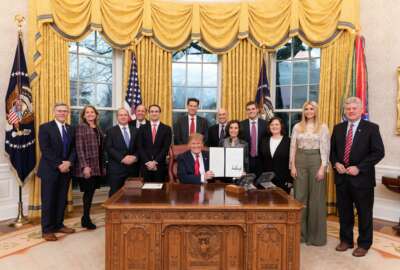

President Donald Trump signed an executive order Thursday giving federal agencies a shared ethics framework for developing and using artificial intelligence.
Best listening experience is on Chrome, Firefox or Safari. Subscribe to Federal Drive’s daily audio interviews on Apple Podcasts or PodcastOne.
President Donald Trump signed an executive order Thursday giving federal agencies a shared ethics framework for developing and using artificial intelligence, as well as expanding job rotation programs to increase the number of AI experts at agencies.
The executive order ties together several AI policies or proposals recently made at the agency or federal advisory council level, and doubles down on an executive order Trump signed in February 2019 making AI a top research and development priority for federal agencies.
The executive order outlines nine common principles agencies must meet when designing, developing or acquiring AI applications. These principles build on AI ethics policies developed by the Defense Department and intelligence community.
These principles instruct agencies to field AI “where the benefits of doing so significantly outweigh the risks,” and ensure that AI applications are transparent, accountable and regularly monitored.
“The ongoing adoption and acceptance of AI will depend significantly on public trust,” the executive order states. “Agencies must therefore design, develop, acquire, and use AI in a manner that fosters public trust and confidence while protecting privacy, civil rights, civil liberties, and American values.”
To better understand where the government currently stands with AI deployment, the executive order gives agencies 180 days to provide an inventory of non-classified, non-sensitive AI use cases currently implemented or in the works. The executive order instructs agencies to update their AI use case inventories each year.
The EO gives agencies another 120 days after publishing their inventories to ensure that those applications either meet the White House’s AI principles or have been retired.
To bring more AI talent into the federal workforce, the executive order instructs the General Services Administration to develop an AI track for the Presidential Innovation Fellows program, and requires the Office of Personnel Management to provide a list of workforce rotation programs and identify ways to expand these programs to increase the number of employees with AI expertise at agencies.
The National Security Commission on Artificial Intelligence has warned Congress and the president about the threat of a “brain drain” of technology expertise in the federal workforce, and recommended standing up a Digital Service Academy to develop new AI talent and a reserve corps modeled after the National Guard to tap into private-sector expertise.
Unlike military service academies, students in the AI academy would enroll to serve a five-year stint in federal civilian government after graduating. The National Digital Reserve Corps, meanwhile, would recruit a cadre of highly skilled digital experts to work at least 38 days a year as short-term advisers, developers and instructors within the government.
The executive order also gives the Office of Management and Budget 180 days to develop a roadmap for policy guidance that will include “a schedule for engaging with the public and timelines for finalizing relevant policy guidance.”
U.S. Chief Technology Officer Michael Kratsios said in a statement that the executive would foster public trust in AI, accelerate government modernization and “further demonstrate America’s leadership in artificial intelligence.”
“Artificial intelligence can be an important tool to help modernize government and ensure Federal agencies are effectively and efficiently delivering on their missions on behalf of the American people. The Trump Administration is committed to advancing AI innovation that benefits all Americans and is underpinned by American values,” Kratsios said.
Sen. Rob Portman (R-Ohio), who attended Thursday’s signing ceremony, said the executive order meets some of the goals of a bill he co-sponsored, the AI in Government Act, and would “ensure our government understands the benefits and pitfalls of this technology as it engages in a responsible, accountable rollout of AI.”
Copyright © 2025 Federal News Network. All rights reserved. This website is not intended for users located within the European Economic Area.
Jory Heckman is a reporter at Federal News Network covering U.S. Postal Service, IRS, big data and technology issues.
Follow @jheckmanWFED



